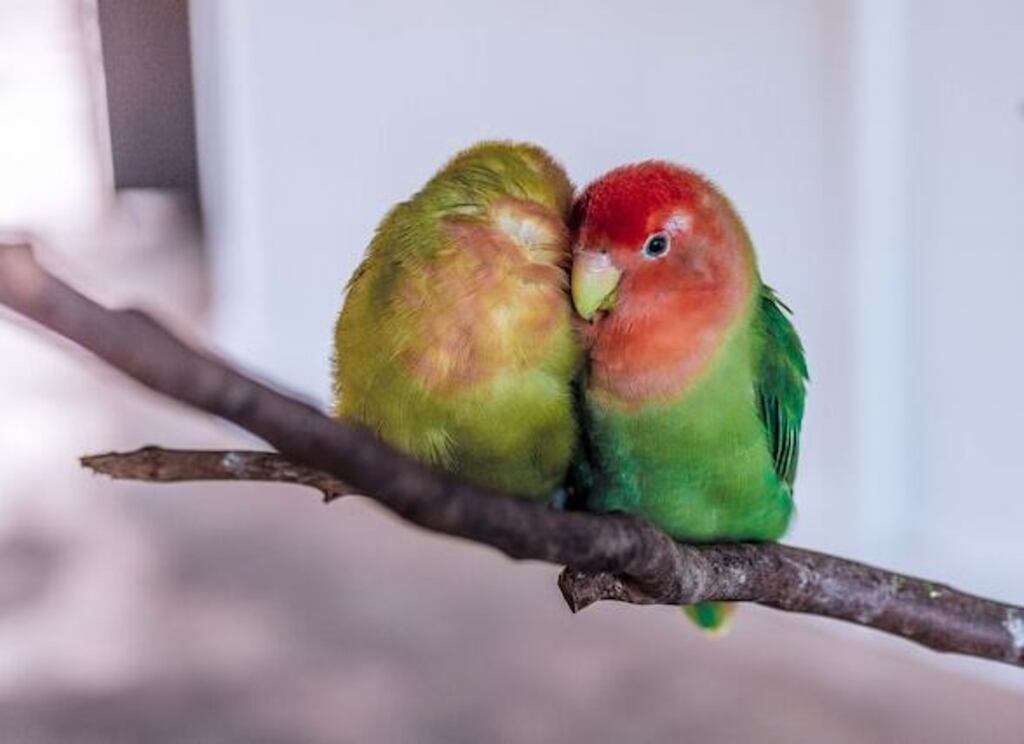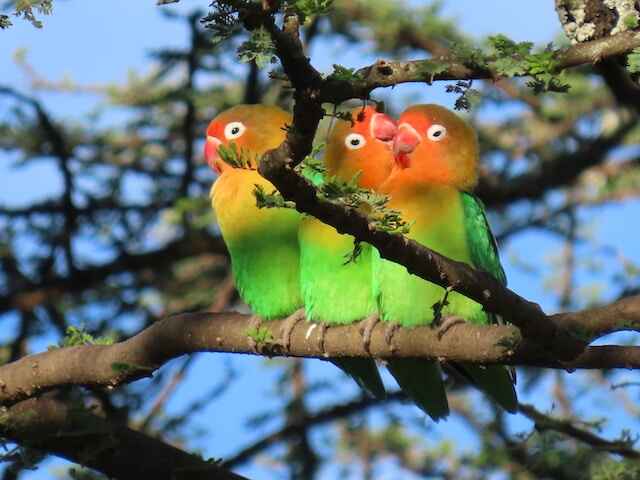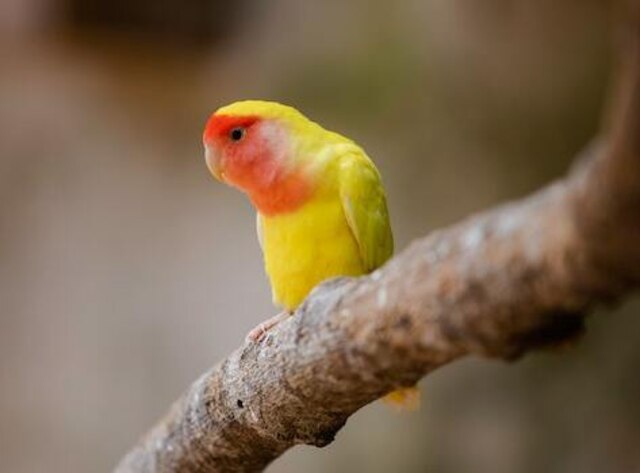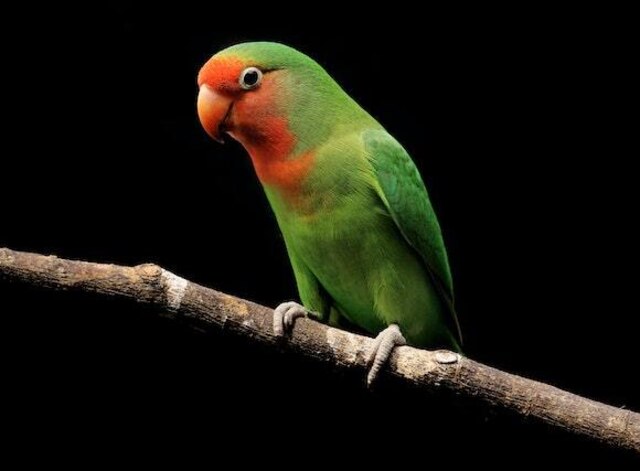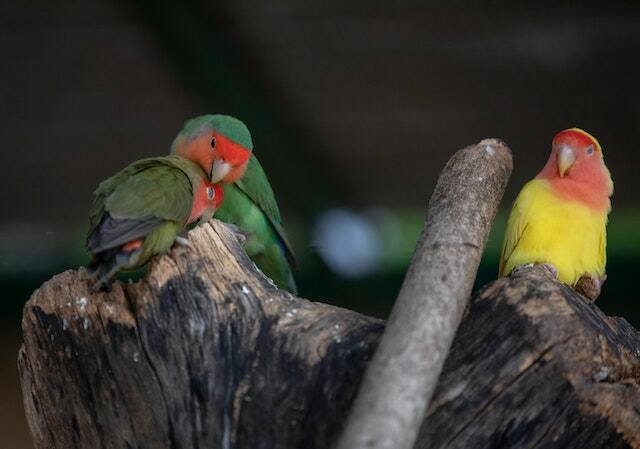Why Do Love Birds Die Suddenly? Discover the heartbreaking reason behind your love birds sudden death. Click to uncover the truth now.
Lovebirds are a popular choice for many bird enthusiasts due to their beautiful colors, affectionate behavior, and playful nature.
However, owning and caring for a lovebird comes with certain responsibilities, including providing a healthy environment and being aware of potential health issues.
Unfortunately, sudden death is a common occurrence among love birds, leaving owners puzzled and devastated.
In this article, we will explore the possible causes of sudden death in lovebirds and provide insights into identifying and treating health issues to prevent such tragic outcomes.
Lovebirds, also known as agapornis, are small parrots native to Africa. They are social creatures that form strong bonds with their mate and can live up to 15 years in captivity.
Despite their popularity, love birds are prone to various health issues, which can lead to sudden death.
As bird owners, it is essential to understand the possible causes of sudden death in lovebirds and take proactive measures to prevent such occurrences.
By being aware of the potential risks and providing proper care, we can ensure the longevity and well-being of our beloved feathered friends.
Table of Contents
Why Do Love Birds Die Suddenly?
Lovebirds may die suddenly due to various reasons, including illness, trauma, toxicity, stress, or breeding complications.
Providing a proper diet, safe environment, and veterinary care can help reduce the risk. Consult a veterinarian for a thorough examination to determine the cause of death.
Exploring Love Birds: Insights and Information
Lovebirds are a popular species of parrot known for their beautiful colors and affectionate nature. Physically, they are small, with a short, hooked beak and bright, vibrant plumage.
In their natural habitat, love birds are typically found in the savannas, forests, and grasslands of Africa.
Physical Characteristics
Despite their delicate and charming appearance, these feathered creatures possess a complex system of physical characteristics that contribute to their vulnerability in certain environments.
Lovebirds have a unique genetic makeup that makes them prone to various diseases. They have a high metabolic rate, which requires a nutrient-rich diet to maintain their health.
Additionally, their respiratory system is sensitive to airborne toxins and pollutants, which may cause respiratory infections that can be fatal.
Lovebirds are also susceptible to heat stress, which can lead to dehydration and death. Furthermore, lovebirds have a small body size, which makes them vulnerable to predators.
They have a sharp beak and claws, which are their primary defense mechanisms, but they are not enough to protect them from larger animals.
Their small size also limits their ability to store fat reserves, which makes them more susceptible to starvation during food shortages.
These physical characteristics make lovebirds vulnerable to sudden death, especially when they are exposed to unfavorable environmental conditions.
In the next section, we will explore the natural habits of lovebirds and how they affect their survival.
Natural Habits
Lovebirds’ natural habits and behaviors play a significant role in their survival in the wild. They are social birds that live in flocks and are often found in pairs.
These birds are also known for their playful nature, and they love to engage in activities such as swinging, climbing, and playing with toys.
Lovebirds in their natural habitat consume a diverse diet consisting of seeds, fruits, and insects. They are also known to eat small amounts of nectar and pollen.
In captivity, lovebirds’ diet should consist of a variety of fresh fruits, vegetables, and seeds to ensure they receive all the necessary nutrients.
Lovebirds are active birds and require plenty of exercise and socialization. They are known to be vocal birds and use their calls to communicate with other birds in their flock.
They also use their behavior, such as head-bobbing and tail-fanning, to communicate with other birds.
However, when lovebirds are kept in captivity, they may not receive the necessary socialization and exercise, which can lead to boredom and stress.
This stress can result in sudden death, which is a common occurrence in lovebirds. In the next section, we will explore the possible causes of sudden death in lovebirds.
Possible Causes of Sudden Death in Love Birds
Sudden death in lovebirds can be attributed to various causes such as poor diet and nutrition, lack of exercise and stimulation, environmental factors, age, and genetics.
A poor diet and lack of exercise can lead to weakened immunity and susceptibility to diseases.
Environmental factors such as poor hygiene and exposure to toxins can also contribute to sudden death.
Understanding these possible causes can help bird owners take preventive measures to ensure their lovebirds live long and healthy lives.
Poor Diet and Nutrition
Inadequate nourishment and nutritional deficiencies have been identified as potential contributing factors to the untimely demise of avian pets belonging to the genus Agapornis.
Lovebirds require a balanced and varied diet that includes fresh fruits, vegetables, and high-quality seed mixes that are rich in nutrients.
A lack of essential nutrients such as vitamins, minerals, and amino acids can lead to various health problems, including weakened immune systems, developmental issues, and organ failure.
To better illustrate the importance of a proper diet for lovebirds, consider these three points:
1) A diet that is high in fat and low in nutrients can contribute to obesity and other health problems,
2) A diet that is deficient in calcium can lead to weakened bones and muscles, and
3) A diet that is lacking in vitamin A can cause eye and respiratory problems.
It is crucial for lovebird owners to provide their pets with a balanced and nutritious diet to ensure their health and longevity.
A lack of exercise and stimulation is another potential cause of sudden death in lovebirds. However, this does not mean that lovebirds should be left to fly freely in the home without supervision.
Lack of Exercise and Stimulation
As we have discussed in the previous section, poor diet and nutrition can be a significant factor in the sudden death of lovebirds.
However, another crucial aspect that can contribute to their sudden death is the lack of exercise and stimulation.
Lovebirds are active and social birds that require ample opportunities to fly, play, and interact with their owners or other birds.
Without proper exercise and stimulation, lovebirds can become bored, stressed, and prone to developing health problems.
A study conducted by the Royal Society for the Prevention of Cruelty to Animals (RSPCA) found that a lack of exercise and stimulation can lead to various health issues, including obesity, respiratory problems, and feather plucking.
Therefore, it is essential to provide lovebirds with enough space, toys, and opportunities to fly and exercise their wings. The table below summarizes the benefits of regular exercise and stimulation for love birds.
| Benefits of Exercise and Stimulation for Love Birds |
| — | — |
| 1. Improves physical health and fitness |
| 2. Reduces boredom and stress |
| 3. Enhances mental stimulation |
In conclusion, lovebirds need regular exercise and stimulation to maintain their physical and mental well-being.
Providing them with enough space, toys, and opportunities to fly and interact can help prevent sudden death and promote a happy and healthy life.
The next section will discuss the impact of environmental factors on the health of love birds.
Environmental Factors
This section will explore the impact of environmental factors on the health and well-being of love birds. Lovebirds are highly sensitive creatures that require a specific environment to thrive.
A change in their surroundings can cause significant stress-related health issues.
Here are some of the environmental factors that can affect the health of love birds:
- Temperature: Lovebirds are sensitive to temperature changes, and sudden fluctuations can cause them to fall ill. They need a stable temperature between 68 and 75 degrees Fahrenheit to stay healthy.
- Humidity: Lovebirds come from tropical environments, and they thrive in environments with high humidity levels. Dry air can cause respiratory problems, leading to stress-related health issues.
- Lighting: Lovebirds require adequate lighting to maintain their circadian rhythm. Lack of proper lighting can cause stress, leading to a weakened immune system and susceptibility to bacterial infections.
- Air Quality: Love birds are sensitive to airborne pollutants, such as cigarette smoke, dust, and chemicals. These pollutants can cause respiratory problems and bacterial infections, leading to sudden death.
Environmental factors play a significant role in the health and well-being of love birds. Stress-related health issues and bacterial infections can lead to sudden death. However, age and genetics also contribute to the overall health of love birds.
Age and Genetics
Environmental factors can significantly affect the physical condition of love birds, making them more susceptible to sudden death.
However, age and genetics are also important factors that contribute to the mortality rate of these feathered creatures.
In terms of age, lovebirds have an average lifespan of 10 to 15 years, but some may live up to 20 years.
As they age, their physical condition may decline, making them more vulnerable to diseases and infections that can lead to sudden death.
Meanwhile, genetics also play a crucial role in determining the lifespan of birds.
Some breeds may be more prone to certain health issues, while others may have a longer lifespan due to genetic factors that make them more resistant to diseases.
Moreover, the breeding process can also affect the genetic makeup of lovebirds, which may result in weaker offspring that are more prone to health problems.
Thus, it is vital to consider the genetics of lovebirds when breeding them to ensure their overall health and longevity.
Identifying and treating lovebirds’ health issues requires a keen understanding of their physical and behavioral characteristics.
By recognizing the signs of illness, owners can take the necessary steps to address the issue promptly and prevent sudden death.
Identifying and Treating Love Birds’ Health Issues
Identifying and treating lovebirds’ health issues is crucial to ensure their well-being and longevity. Visiting a veterinarian is the first step in diagnosing any health problems your love birds may have.
Proper medication and care, as prescribed by the veterinarian, is essential to treating any underlying health issues.
Additionally, providing support and proper housing, such as a clean and spacious cage, can help prevent future health problems.
Visiting a Veterinarian
Consulting with a veterinarian can be a helpful step in addressing any health concerns that may be contributing to the sudden death of one’s avian companion.
Veterinarians who specialize in bird care can provide valuable insights into the unique health needs of love birds and offer guidance on how to properly care for them.
With their extensive knowledge of bird guides and ornithology, veterinarians can help diagnose and treat various health issues that may be impacting a lovebird’s well-being.
In addition to treating physical ailments, veterinarians can also identify and address stress-related health issues that may be contributing to a lovebird’s sudden death.
They can provide guidance on proper nutrition, exercise, and environmental conditions that can help prevent stress-related health problems from arising.
By visiting a veterinarian, lovebird owners can take proactive steps to ensure the long-term health and well-being of their feathered companions.
Proper medication and care can also be provided by a veterinarian to help prevent sudden death of love birds.
Proper Medication and Care
Proper medication and care administered by a qualified veterinarian can significantly improve the chances of preventing the untimely demise of a beloved aviary companion.
Lovebirds are delicate creatures that are susceptible to various illnesses and diseases such as respiratory infections, parasitic infections, and malnutrition.
With the help of a knowledgeable veterinarian, one can ensure that their lovebird is receiving the proper medication and care needed to combat any health issues that may arise.
To further enhance the health and wellbeing of a lovebird, it is important to provide a suitable diet and bird supplies to reduce the risk of stress-related health issues.
A balanced diet consisting of fresh fruits and vegetables, high-quality bird feed, and clean water will ensure that the lovebird is receiving the necessary nutrients to stay healthy.
Additionally, providing bird supplies such as toys, perches, and nesting materials will create a comfortable and stimulating environment for the lovebird to thrive in.
By taking these necessary steps, one can ensure that their lovebird is receiving the proper care and support needed to live a long and happy life.
Moving onto the next subtopic, support and proper housing play a crucial role in the overall health and wellbeing of a love bird.
Support and Proper Housing
The support and housing provided to lovebirds can be compared to the foundation of a house, as both are essential for the stability and longevity of the structure.
Lovebirds require a spacious cage with ample room for movement and flying, as well as perches, toys, and bird supplies for mental stimulation and exercise.
A lack of appropriate housing can lead to stress-related health issues, which can be fatal for these sensitive birds.
To ensure proper housing, lovebird owners should seek expert guidance from avian veterinarians or experienced bird breeders.
These professionals can provide guidance on the appropriate cage size, type of perches, and suitable toys for lovebirds.
Additionally, bird supplies such as food, water, and grooming tools should be readily available for these birds to maintain their health and well-being.
By providing adequate support and housing, lovebirds can thrive in their environment and avoid sudden deaths caused by preventable factors.
In conclusion, proper support and housing are essential for the health and longevity of lovebirds. Neglecting these factors can lead to stress-related health issues and sudden deaths.
Lovebird owners should seek expert guidance and invest in appropriate bird supplies to provide their feathered friends with a comfortable and stimulating environment.
Conclusion
In light of the evidence presented, it can be inferred that sudden death in avian species may be attributed to various factors such as environmental stressors, genetic predisposition, or infectious diseases.
While providing proper support and housing for love birds can reduce the chances of sudden death, it is not a guarantee that it will not occur.
To ensure the well-being of pet birds, it is essential to understand the various factors that may contribute to sudden death.
Here are some possible reasons why love birds may die suddenly:
- Lack of proper bird supplies such as clean water, fresh food, and toys to stimulate their mental and physical health
- Stress-related health issues, such as exposure to loud noises, overcrowding, or the presence of predators
- Genetic predisposition to certain illnesses or abnormalities
- Exposure to infectious diseases from other birds or contaminated environments
- Abnormal changes in the bird’s environment, such as sudden temperature changes or exposure to toxins.
By being aware of these factors and taking steps to mitigate them, pet owners can help ensure that their love birds live healthy and happy lives.
While sudden death can be a heartbreaking experience, it is important to remember that by providing proper care and attention, pet owners can help prevent it.
Frequently Asked Questions
What is the average lifespan of a lovebird?
Lovebirds are a popular type of small parrot, kept as pets by many people across the world. The average lifespan of a lovebird is approximately 10 to 15 years, depending on various factors such as diet, living conditions, and genetics.
These birds are social creatures and require companionship to thrive, so it is important to keep them in pairs or groups.
Additionally, proper care and attention, such as providing a balanced diet, clean living space, and regular vet check-ups, can help to extend their lifespan.
It is important to remember that while lovebirds are beloved pets, they are living beings with individual needs and requirements, and it is our responsibility to ensure their well-being throughout their life.
Can love birds die from loneliness?
Lovebirds are social creatures that require social interaction for their well-being. When they are deprived of social interaction, they can experience stress, anxiety, and depression, which can lead to a weakened immune system and ultimately, death.
While lovebirds can survive on their own, they thrive in the company of other lovebirds or even other bird species.
It is important to note that a sudden death in lovebirds may not necessarily be due to loneliness alone, as there are other factors such as disease, poor nutrition, and environmental conditions that can also contribute.
Therefore, it is essential to provide lovebirds with a suitable environment, a balanced diet, and regular veterinary care to ensure their overall health and well-being.
How often should lovebirds be taken to the vet for check-ups?
Regular check-ups with a veterinarian are crucial for the health and well-being of love birds. These birds require annual check-ups to ensure that they are healthy and do not have any underlying health issues.
However, it is important to note that love birds can be prone to certain health problems such as respiratory infections and nutritional deficiencies, which may require more frequent visits to the vet.
It is also important for bird owners to monitor their bird’s behavior and eating habits in order to catch any potential health issues early on.
By maintaining a regular schedule of check-ups, love bird owners can ensure that their feathered friends stay healthy and happy.
What are some common signs of illness in love birds?
Love birds are delightful and charming pets, but they are susceptible to a wide range of health issues that can manifest in various ways.
Some common signs of illness in love birds include:
- Lethargy
- Weight loss
- Changes in eating or drinking habits
- Difficulty breathing
- Feather plucking
- Abnormal droppings
Regular visits to the veterinarian can help prevent and detect these issues early on.
It is important to note that sudden death in lovebirds can be caused by a variety of factors such as trauma, infections, environmental stressors, and genetic predispositions.
Owners should remain vigilant about their pets’ health and seek prompt veterinary care if any concerning symptoms arise.
Is it possible for love birds to die from overeating or obesity?
Love birds are known to be active and energetic creatures that require a balanced diet to maintain their health. While overeating and obesity may be a concern for other pets, it is unlikely to be the cause of sudden death in love birds.
Instead, sudden death in love =birds is typically caused by underlying health issues such as respiratory infections, organ failure, or trauma.
It is important for lovebird owners to monitor their pet’s behavior and seek veterinary care if any signs of illness or distress are observed.
Providing a healthy diet, adequate exercise, and a clean living environment can also help prevent potential health issues and promote the well-being of lovebirds.
Conclusion
Love birds are beloved pets that bring joy and companionship to many households. However, the sudden death of a lovebird can be distressing and concerning for pet owners.
Understanding the possible causes of sudden death in love birds is crucial for their well-being and longevity.
There are several factors that can contribute to the sudden death of love birds, including poor nutrition, environmental stress, and infections.
Identifying and treating health issues early on is vital in preventing sudden deaths in love birds.
As responsible pet owners, it is important to provide a healthy and safe environment for love birds to thrive in.
This includes providing a nutritious diet, clean living space, and regular veterinary check-ups.
In conclusion, sudden death in love birds can be prevented by taking proactive measures to ensure their health and well-being.
As pet owners, we have a responsibility to provide the best possible care for our feathered friends.
By being knowledgeable, experienced, and compassionate, we can help prevent sudden deaths and ensure that our love birds live long and happy lives.
Remember, prevention is key, and early intervention is crucial in ensuring the health and longevity of our beloved pets.

